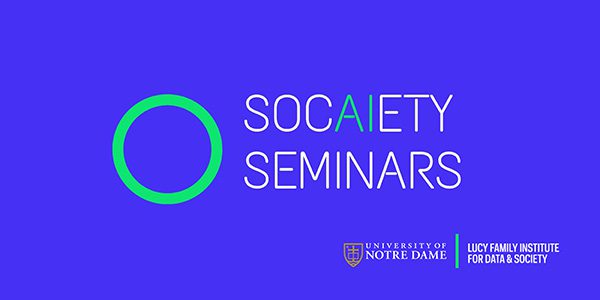The Global Church and Islam – The One God in Islam and Christianity
Subscribe to the ThinkND podcast on Apple, Spotify, or Google.
Featured Speakers:
- Nayla Tabbara, President of Adyan Foundation for Diversity, Solidarity and Human Dignity
- Gabriel Said Reynolds, Jerome J. Crowley and Rosaleen G. Crowley Professor of Islamic Studies and Theology, University of Notre Dame; Author of Qur’an and the Bible and Allah: God in the Qur’an
The third event in The Global Church and Islam series featured Nayla Tabbara, President of Adyan Foundation for Diversity, Solidarity and Human Dignity. The event was moderated by Gabriel Reynolds, the Jerome J. Crowley and Rosaleen G. Crowley Professor of Theology at the University of Notre Dame. While the previous session focused on the historical aspect of Muslim-Christian relations, exploring their relationships in the past and present, this session turned to theological questions of belief and practice. Tabbara discussed the topics of the definition of Islam, Islamic practices and traditions, and how to foster fruitful dialogue with members of other faiths.
Tabbara opened the event by correcting the English translation of “Islam”, a word that means “abandoning oneself in confidence”. She went on to give a definition of Islam that encompassed this offering of oneself to God, as well as trusting that God wants the best for all and an individual resolve to do good. Though this definition has been given for Islam, it is one that encompasses all those who have a personal quest for a God that they have faith and confidence in.
Reynolds then directed the conversation to the practices and beliefs of Islam. A common misconception about Islam is that believers are servants or slaves of the religion and its demands. Tabbara pointed out that this is simply untrue, though an understandable mistake as the words for both “slave” and “adorator” are the same. Muslims do not see themselves as slaves, but rather as representatives of God on Earth. They see themselves as having been given the responsibility of upholding moral values and taking care of the creation that God has entrusted to them. This misunderstanding served as a reminder to participants that they must be aware of stereotypical images and beliefs of Islam.
In discussing prayer in Islamic practice, Tabbara identified the multiple types of prayer that Muslims practice. Though the ritualistic prayer that Muslims pray five times per day is the most widely known, prayer for Muslims also includes invocations to God, repetitions of His name and personal conversations with Him. Tabbara also expressed her opinions on the beauty of ritualistic prayers as a sign of fidelity. These prayers are meant to be a moment of presence with God, time for one to be present with Him despite the activities of that particular day. Tabbara concluded this topic of discussion by emphasizing the common God between Islam and Christianity. Though many of the practices and beliefs are different, at the end of the day, both Muslims and Christians proclaim belief in the same God.
Tabbara then offered advice on conducting Muslim-Christian dialogue from her experiences. She identified two steps that must be present for a fruitful discussion. The first is an encounter with an individual of another faith. During this initial meeting, both individuals must abandon any preconceived notions or biases and see the other as a person. Any incorrect beliefs or ideas about the other must be cleared up. The second stage is a period of honest discussion. Each must voice any fears or disagreements and both must come together to collaborate. Tabbara emphasized her belief that Muslims and Christians must collaborate and fight together for the causes that both groups believe in. All have a duty to practice religious social responsibility and practice what they preach. An example of both groups coming together for a common cause is the Document on Human Fraternity for World Peace and Living Together signed by both Pope Francis and Sheikh Ahmed el-Tayeb, the Grand Imam of Al-Azhar in 2019. This document expresses the beliefs and aspirations of both groups related to religious unity and working together towards common goals.
To conclude the event, Reynolds posed a series of questions from participants related to the role of women in Islam, as well as the comparison of various Catholic beliefs to those of Islam. After responding to these questions, Tabbara reminded participants that asking questions about where Islam stands in relation to Christianity is only the first step of discussion. In order to engage in more fruitful dialogue, one must pose deeper questions. Before releasing participants to breakout rooms, the speakers offered two questions for discussion: Is it right to speak of Muslims, Christians and Jews as a family of faiths? What are some areas of difference between Islamic and Christian teaching on God and God’s relationship with humanity?
- The Qur’anic definition of Islam is having confidence in God and knowing that He wants the best for us, as well as wanting to do good while on Earth. This is a definition that can also fit other faiths, including Christianity. (7:03)
- “When the Qur’an is speaking of Muslims, it is speaking of all those who belong to faiths or who have a personal quest for a God that they have faith and confidence in.” (Nayla Tabbara, 9:26)
- One myth of Islam depicts Muslims as servants and slaves of their faith. They do not see themselves as slaves, but rather as adorators and representatives of God on Earth. (10:57)
- There are many types of prayer in Islamic tradition. These include not only the ritualistic prayer prayed five times per day, but also invocational prayers, repetition of God’s name and talking personally with Him. (14:55)
- “For me, it’s [prayer] a beautiful sign of fidelity, that you’re doing this five times per day even though sometimes it’s repetitive and sometimes you’re exhausted.” (Nayla Tabbara, 17:03)
- Having a fruitful dialogue with members of other faiths requires an abandonment of biases and preconceived notions, a humanization of the other individual as a person with different beliefs, a safe environment where fears and disagreements can be discussed and a collaboration through which mutual problems can be resolved. (24:19)
- “I really really dislike ‘joining forces against’. I think we all need to ‘join forces for’. We need to be working together: Christians, Muslims and people of good will.” (Nayla Tabbara, 35:31)
- “The verse says that God made her [Mary] grow like a plant, a beautiful plant. So, she’s growing with the care of God like a flower and that is a beautiful image. At the same time, it shows what it means to have confidence and give yourself in confidence to God.” (Nayla Tabbara, 45:43)
- Understanding where Islam stands in relation to the beliefs of Christianity is only the first step in the discussion. Consider asking deeper questions about Islam, where it is unique, what challenges it is facing and the feelings of individual believers to further develop the dialogue. (1:00:14)
Related Content
Climate Change and The Limits of Narrative
Join the Kellogg Institute for the introductory session of a workshop refining Kellogg Faculty Fellow Roy Scranton’s draft book project “Ethical Pessimism: Climate Change and...
View EventReunion 2024
Alumni Education Programming Click each program title to learn more. To return to the Reunion 2024 website on my.nd.edu please click here. ND Perspectives: Election 2024 and the...
Read ArticleA Brave New World of AI Governance
Explore the connection between data, geopolitics and governance, regulation, self-regulation while discovering examples of good and bad practices in various sectors, such as...
View Event


